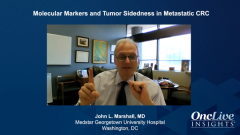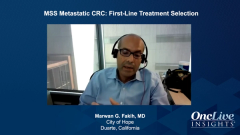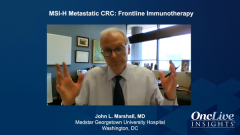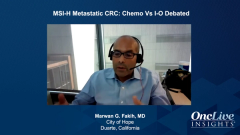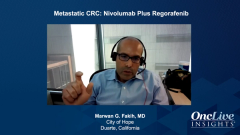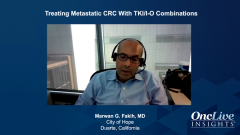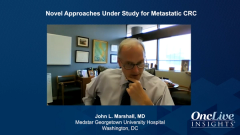
Metastatic CRC: Nivolumab Plus Regorafenib
Considerations for treating patients with metastatic colorectal cancer with the combination of nivolumab and regorafenib based on preliminary data.
Episodes in this series

John L. Marshall, MD: Marwan, let’s shift gears a bit. We’ve talked a lot about initial lines of therapy, and 1 to 3 years of chemotherapy and maintenance using the traditional drugs that we have, and the biologics that we have. But we all have lots of patients who have incurable metastatic disease who have essentially exhausted targeted therapies at the beginning, and chemotherapies. So we have a huge unmet need, obviously, for many patients.
We have this agent, regorafenib, that’s been approved for several years. It demonstrates a clear single-agent benefit in the right patient, but there is no clear biomarker for it. And yet, what we’re seeing are some interesting combinations, with immunotherapy [IO] and other strategies. Maybe you can describe the rationale behind throwing these 2 kinds of therapies together in this more refractory patient, and discuss some of the data out there to support this approach, some of which is your data?
Marwan G. Fakih, MD: Thank you, John. I think regorafenib is an interesting tyrosine kinase inhibitor. There has been some interest in combining VEGF-receptor tyrosine kinase inhibitors with immunotherapy for many reasons, one of which is the role of the VEGF pathway as an immunosuppressive path in patients with cancer. That’s been shown in multiple tumor types, not just in colorectal cancer. We all know of data in renal cancer, HCC [hepatocellular carcinoma], and other cancers. The rationale is that it may reduce Tregs [regulatory T cells] by blocking the vascular endothelial growth factor receptor pathway in solid tumors. And indeed, this has been investigated now in multiple studies.
In microsatellite stable colon cancer, I think one of the first studies looking at this had been the Japanese REGONIVO. This was reported on almost 3 years ago at ASCO [American Society of Clinical Oncology meeting] in an abstract poster format. Investigators looked at 25 patients, 24 of whom had microsatellite stability. And surprisingly, patients with colon cancer had a 33% objective response rate.
We all know that regorafenib alone is associated with a 1% response rate. Nivolumab alone is not associated with responses that are typically described in an anecdotal fashion. And more interestingly, the PFS [progression-free survival] was approximately 7 months in that trial as well.
We have recently reported on the US phase 2 clinical trial that looked at a much larger sample size, 70 patients. In that study, we saw a disappointing response rate—7%—which is much lower that the Japanese-reported response rate. However, what was very interesting and also confirms prior preliminary findings is that when we started stratifying into liver and nonliver metastases, it was noted that the response rate in the nonliver metastases group was 22%. The median progression-free survival in that patient population was about 3.5 months, with some of those patients responding for more than 1 year.
John L. Marshall, MD: I don’t remember, do you remember if those responses were lower in the Japanese study?
Marwan G. Fakih, MD: Among the patients with liver involvement, only 1 patient responded. That’s 1 out of 12 patients. They looked at the liver being chosen as a target lesion. But when the target lesions were lung target lesions, the response rate was 50% on the Japanese clinical trial. So, there is something there. It may be that the liver may not be an absolute biomarker of resistance, but it is certainly associated with a high likelihood of poor response.
In the US REGONIVO trial, 47 patients had liver metastases, and 0 out of 47 patients had the response. The PFS was 1.8 months. So clearly, there is something. And this correlates with preclinical data. If you get a mouse and you inject the tumor in the subcutaneous tissue, it responds to PD-1. Now you get the same mouse, you inject the liver and the subcutaneous tissue with the same tumor, but the subcutaneous tumor does not respond. Not only does the liver metastasis not respond subcutaneously, but the liver metastasis affects the tumor microenvironment in the subcutaneous tissue. There’s some elegant preclinical work suggesting that liver metastasis may have a systemic impact on the immune response in patients.
John L. Marshall, MD: It seems to me that if it hasn’t been done, it should be. Take those data that you just cited and map it out by site of metastasis, maybe right and left, maybe molecular profiles, and see if it’s all boxed into a group. And then if it is, let’s go with this. Why hasn’t this kind of signal, 3 years later, been made more of? Any thoughts?
Marwan G. Fakih, MD: We’re working on it, John. I can tell you our group presented data on this at ASCO. We looked at 95 patients with microsatellite stability, and what I can tell you is that TMB [tumor mutation burden] is not a biomarker of response in this patient population. PD-1 is not a biomarker of response. I can tell you APC is not a biomarker of resistance. We see responses in patients who are APC-mutated, who are RAS-mutated, RAS wild-type, TMB of 1, and PD-L1–negative. And so, more work needs to be done. But we are interrogating this concept of liver metastasis further.
John L. Marshall, MD: Joleen, I tend to prefer to use regorafenib in my asymptomatic patient anyway. I seem to get a bit more bang for my buck there when I use the drug as a single agent. Do you have any thoughts or reflections on these IO combinations? And if you were faced with this problem, would you treat the patient outside of a clinical trial? What are your thoughts?
Joleen M. Hubbard, MD: I guess with the more disappointing US studies compared to the Japanese studies, I’d be reluctant to use this outside of a clinical trial at this point. I also am a believer that if we use regorafenib earlier in the course of therapy instead of waiting until chemotherapy has been recycled 2 or 3 times—I think there are enough data from trials to show this—if we use it a bit earlier, like in a true third-line setting, we do have improved progression-free survival. I’m not entirely convinced that immunotherapy is adding that much more if regorafenib is used in a true third-line setting. So I would stick to a trial for this combination. That way we are collecting the data prospectively. Then we can see if there is a true difference here.
John L. Marshall, MD: Ultimately, if you’re getting those kinds of response rates in this patient population, if we could see that consistently this kind of patient has a 30% or greater response rate, my guess is guidelines would approve this. This is something that would clearly transform what we’re doing. There are almost no responses after second-line therapy in colorectal cancer if you’ve played your EGFR therapy.
Transcript Edited for Clarity


